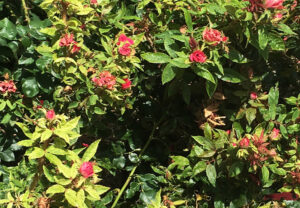Emerging industry research can grow your business
Staying informed on the latest horticulture research can keep you on the industry’s leading edge and ahead of the competition.
Research and innovation are fundamental to who we are and what we do at ICL, but our interest in “what comes next” goes beyond our R&D. We make a point to stay informed on research throughout the ornamental horticulture industry—and to share findings to help you grow your plants and your business to new levels of success. These are a few research topics and ongoing programs on our radar that may profit your business and you.
Technology for early problem detection
No matter what you grow, early detection of production problems is crucial. Two programs we’re watching involve new technology to help you do just that. North Carolina State University researchers have developed an electronic patch that monitors for viral and fungal pathogens, drought, salinity (including saltwater intrusion in irrigation water), and other conditions when attached to plant leaves.

Electronic plant monitors can provide real-time data on plant health (image courtesy of NCSU).
In testing, the patch could detect a virus in tomatoes more than a week before a grower could. While studies continue, the technology has broad implications for all crop types, including outdoor and greenhouse ornamentals.
Horticultural drone technology has been a focus for University of Maryland researchers for more than six years, even leading to a drone program designed for growers. Aided by a 2023 Horticultural Research Institute (HRI) grant, new research digs deeper into drone plant monitoring and other IPM uses. Project priorities include drone use for early detection of insects, disease, and other stresses. Planned testing examines drone use for pesticide applications, biological control organism releases, and monitoring of nutrient and water stress in greenhouse and nursery plants.
Hope for the landscape rose industry
The Census of Horticulture Specialties notes that professional landscapers buy more than one-third of all garden roses sold. But rose use by landscapers is dropping nearly 10% a year because of rose rosette disease (RRD). Several research projects now focus on RRD, the rose rosette virus, and the vector mite behind it.

Rose rosette disease (image courtesy of Texas A&M University).
Supported by USDA Specialty Crop Research Initiative funding, a multi-state team led by Texas A&M researchers focuses on developing RRD-resistant landscape roses. Multi-state trials will yield best practices for RRD management, including chemical and cultural controls, and disease-resistant genetic resources. Severely hit regions such as the East Coast and Midwest may finally have effective RRD strategies. Plus, new strategies may prevent RRD’s advance into prime rose production regions, including Arizona, Florida, and the West Coast.
In an HRI-funded project, Texas A&M researchers are exploring genetic pathways behind RRD’s witches broom, distorted shoots and flowers, and excessive thorns. Development of molecular markers for these growth changes will advance and accelerate breeding efforts for RRD-resistant roses.
University of Arkansas researchers are at work identifying and characterizing the most effective predatory mite species for controlling the mite species that serves as vector for rose rosette virus. Their success will represent the first practical solution for in-the-field RRD control—something the ornamental industry and rose lovers everywhere will celebrate.
Marketing for the plants you grow
Consumer demand for sustainable landscapes and native plants continues steady growth. HRI-funded University of Tennessee research published last year examined native plant producers and their production practices. One notable finding was that native plant producers used more progressive production and business practices, adopted strategies to differentiate their businesses, grew higher quality crops—and got higher prices.
New research is building on that knowledge by identifying better ways to market and promote the native plants grown. Researchers will survey consumers for insights on how different marketing messages influence their interest in native plants. As native demand increases, these insights in effective plant marketing and promotion will profit all partners along the native plant supply chain.
More HRI-funded research at North Carolina State University will simplify your plant marketing efforts, whether you’re a grower, grower-retailer, broker, or landscaping firm. The project will produce ready-to-use messaging about the environmental and ecological benefits of plants (natives and non-natives) to help you connect with your sustainability-minded customers and end consumers.
As ornamental horticulture research continues to advance at a dizzying pace, you can look to ICL to keep you informed about research-grounded results to help you and your business grow.

